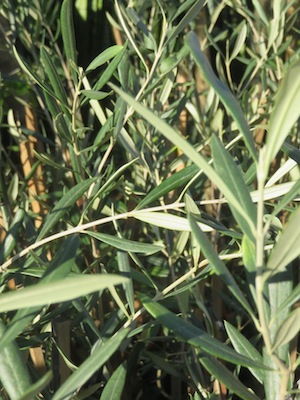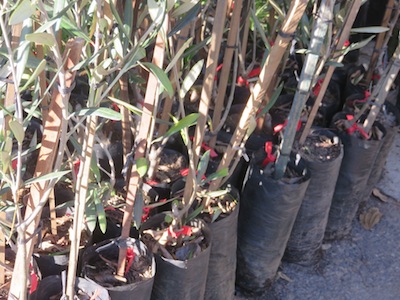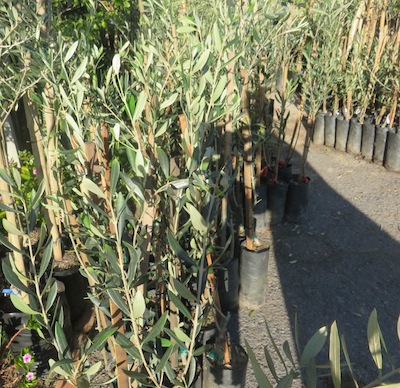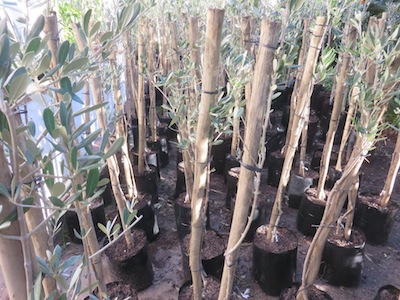Dear Reader, in this age of AI created content, please support with your goodwill someone who works harder to provide the human-made. Sign up in the righthand column or bottom of this page. You will receive my hand illustrated monthly newsletter RESTORE NATURE and access to the biodiversity garden design course as I write...and nothing else, I respect your time.
Commercial scale olive propagation with minimal technology
 successful olive propagation gives thriving lush olive saplings for sale from a local olive farm 081 8023703
successful olive propagation gives thriving lush olive saplings for sale from a local olive farm 081 8023703my interest in olive propagation started with a bumper harvest
My exploits in olive propagation have this background. Four years back, our black mission olive tree which had only just started to bear abundantly after 25 years, had a bumper harvest of about 30 Litres, after the first time my husband pruned his tree. After processing the harvest, from which he produced the most delicious olives I've ever had, we found out how easy it is to do.
I researched on olive harvests and found that our tree was an exceptional bearer and decided to propagate from my tree.
Why I want to learn about
olive propagation
I would like to get into olive propagation because I'm a horticulture geek, and for the purpose of supplying trees to NGO’s and the city to create urban olive groves with the sole purpose of job creation and poverty alleviation. I worked out that if one could sustain these high yields for making pickled olives, not oil, 20 trees would bring one individual an income of four thousand rands monthly, with only part time work. I have made the pickles, but I cannot speak for the profitability of a business based on oil extraction or soap making, or selling oil to be used for spiritual purposes.
 Coratinas from Maggie's olive farm
Coratinas from Maggie's olive farmThe knock on benefits of olive propagation in Cape Town
The individuals in this street tree olive growing program could keep the street trees planted in the vicinity of their homes trimmed and looked after, and be able to put bread on the table while they pursued their own entrepreneurial development or further education and training towards higher income earning. They could train up and pass on the trees to other people when they themselves had no more need of them, or keep up the olive business and expand it. We could create an olive culture in the heart of Cape Town and with it the knock on effects of olive festival tourism going to the poorest parts of the city. This would green neighbourhoods direly in need of street trees, and uplift them economically. I shared the idea with a local Imam in Salt River and he was very excited by the idea because olive trees are sacred or are involved symbolically in many ways in all the Abrahamic faiths.
The first germ of
the 'olive branch' project
This idea was born from a creative engagement with an old friend and I would like to acknowledge her input, and the ideas we wanted to develop together, but must confirm with her how she feels about having her name attached to mine. We decided that 'the olive branch project' would be an apt name.
The idea was that I would supply the trees for next to no cost, having a tree to propagate from, while sustaining myself from my writing. This grand plan crashed when I and my friend’s attempts at propagation from cuttings were fruitless. I tried three times to no avail, but I will try again this winter, and keep trying till I get it right.
 Leccino olive saplings from the farm
Leccino olive saplings from the farmOlive trees as a sustainable option for ecological gardening
While reading about water-wise gardening in Mediterranean climates, I came to the conclusion that olive trees are a crucial part of such a gardening system. Not only do they supply food, need no watering in our blistering summer drought, but they are native to the whole of Africa and the near east. They are one of the few plants indigenous to the Cape which have been massively horticulturized to produce food. The other is the Tsamma melon (giving rise to watermelons) further than that our indigenous food plants are still in their wild unbred state.
Olives would be pivotal in any locally adapted ecological food producing system, aligned with permaculture or other soil saving agricultural methods. The problem is that massive olive planting caused the desertification of Greece, as I touch on in my eight 'water wise' articles based on the writing of Heidi Gildemeister. This was as Gildemeister explains, because cork oak forests with mat roots were replaced with olives that had tap roots, leaving the soil around the olives unstable, and it eroded away. One could prevent this by planting soil stabilizers such as Aristeas (a soil stabilizer and a possible cut flower?) around the olives, or with terracing and an intense mulching program. I did not think of finding olive cultivars with mat roots as I did not know of their existence.
Meeting a local specialist at
olive propagation
I set out to buy more olive trees for my small garden, and found a local supplier who does olive propagation in the country in shade houses and brings the stock through to her home in town. She has specialized in olive propagation, and speaking to her was a revelation. She also knows people with similar motivations to mine for growing olives, a successful school project up country, with whom she wished to put me in contact.
What I learned about
olive orchards
First I learned that an olive harvest could be as irregular as ours, due to the absence of a cross pollinator. This needs to be another bred variety like Frontoio. I thought another mission would supply adequate pollination, but Maggie (the olive farmer) explained that the presence of just one Frontoio in a row of missions will stablilise and increase yield and fruit size.
Her trees are varieties with root mats rather than tap roots, ideal for soil conservation. All her olives are clones from 20 year old trees. This means the clone is ‘mature’ even if the tree is young, and they produce early. Indeed I saw a tree only 30 cm high in her nursery producing 3 big fat olives.
All the oil and pickling is done with black mission locally. American missions have the best fruit according to Maggie and 12-16% oil, making them ideal for pressing. However, each olive variety has its own ideal functions, flavor and aroma, which I will explore more deeply on another page.
New and expert information on
olive propagation
Maggie takes cuttings from her old trees which have fruited. The cuttings are heavier and thicker than the cuttings I took based on online instruction. They are not pencil thick, but with a gnarled elbow of older wood a good 15-20 mm thick.. She dips them in hormone powder and plants each one in a 3kg bag. Apparently now, in June, our midwinter and rainy season, is the ideal time to take cuttings. This is not what online advice told me either. I always took my cuttings during flowering time in September. June is also the ideal time to plant olive trees, because the winter rains are upon us and no irrigation is needed till they are established.
The olive propagation instructions I went by from the internet, with misting and bottom heat, appear to be excessive. Maggie does not use these, the cuttings are propagated in a simple net house with spray irrigation. She believes they just need ‘normal’ watering and misting is unnecessary. The olive cuttings may be in a protected environment like a shade house but they need a lot of air and sun, filtered, during the growing stage. They will drop all their leaves, but new shoots will grow after they root.
One of the biggest dangers is overwatering. Oooops.. this may have been another one of my list of failings. I had them under plastic which was constantly dripping with condensation and watered them every few days under the plastic. They were drenched. This was because the interwebs said they needed misting, which I could not provide.
 Mission olive saplings awaiting planting
Mission olive saplings awaiting plantingForward !
At the end of our conversation I bought seven young trees at half the retail value ! and received one as a gift !
I will record Maggie’s planting tips and the information she sent me on olive varieties and their purposes on another page. She was happy to share information on olive propagation, saying with a Mona Lisa smile, you do need green fingers too !
I wish anyone who attempts to start an orchard, or to grow olives a thousand blessings as they enter this ancient horticultural tradition which started in Africa with the Phoenicians. I look forward to further conversations with Maggie and to creating a small urban olive orchard project as a plant stock provider for olive growing projects in urban Cape Town.
However the rooting rate was low. I took 50 cuttings at least and only one has survived. It could be a combination of my own misguided practice and negligence. They must not be damp, but they must never dry out either. I grew them without a shade house and hand watered them with a watering can.
------
Home page for more practical tips on natural gardening
------
Vegetable gardening and growing food the natural way, with a list of the easiest food plants to grow
------
Maggie the olive specialist 081 8023703
------
links to my olive harvest album
Restore Nature Newsletter
I've been writing for four years now and I would love to hear from you
Please let me know if you have any questions, comments or stories to share on gardening, permaculture, regenerative agriculture, food forests, natural gardening, do nothing gardening, observations about pests and diseases, foraging, dealing with and using weeds constructively, composting and going offgrid.
SEARCH
Order the Kindle E-book for the SPECIAL PRICE of only
Prices valid till 30.09.2023
Recent Articles
-
Geography Research Task
Jan 31, 25 11:37 PM
To whom it may concern My name is Tanyaradzwa Madziwa and I am a matric student at Springfield Convent School. As part of our geography syllabus for this -
Eco Long Drop Pit Latrines Uganda
Nov 29, 24 02:45 AM
Good evening from the UK. My name is Murray Kirkham and I am the chairman of the International and foundation committee of my local Lindum Lincoln Rotary -
Landscape Architect
Oct 01, 24 10:42 AM
I so appreciate your informative description! Your experimentation and curiosity with the seeds, germination, and rearing of the maggot are exciting to
"How to start a profitable worm business on a shoestring budget
Order a printed copy from "Amazon" at the SPECIAL PRICE of only
or a digital version from the "Kindle" store at the SPECIAL PRICE of only
Prices valid till 30.09.2023





